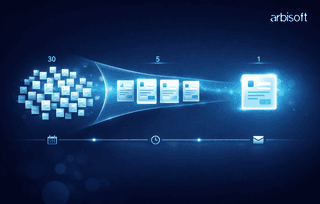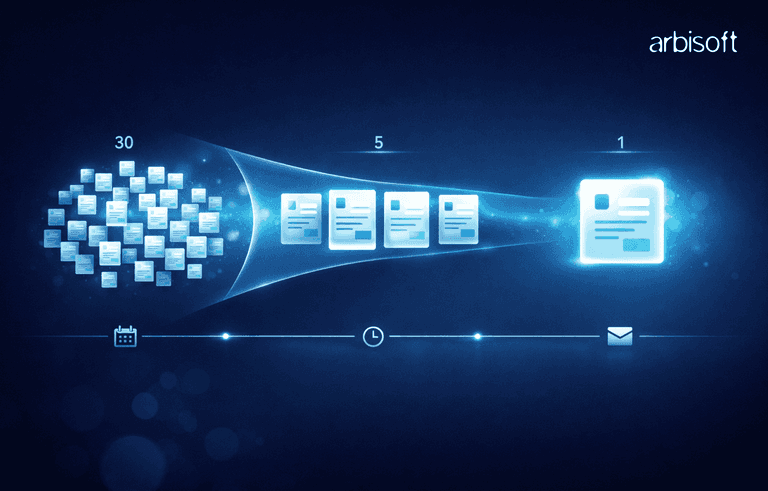We put excellence, value and quality above all - and it shows




A Technology Partnership That Goes Beyond Code

“Arbisoft has been my most trusted technology partner for now over 15 years. Arbisoft has very unique methods of recruiting and training, and the results demonstrate that. They have great teams, great positive attitudes and great communication.”
Apache Spark vs. Apache Flink: A Comparison of the Data Processing Duo

In this digital world, where over 2.5 quintillion bytes of data are generated every day, businesses need powerful tools to process and analyze this massive amount of information. Choosing the right data processing framework can make all the difference in how quickly and effectively you can turn raw data into valuable insights.
Apache Spark and Apache Flink are two of the most popular frameworks in the big data world, each offering unique strengths. In this blog, we'll break down the differences, applications, features, and recent developments of these frameworks to help you pick the best one for your needs.
A Brief History of Data Processing
Data processing has evolved significantly over the years, driven by the need to manage and analyze ever-growing volumes of data. Let’s take a quick look at how it has developed:
- Batch Processing Era: Initially, data was processed in batches, meaning large amounts of data were collected and processed together at set times. This method worked well for some tasks but was slow when quick insights were needed.
- Distributed Computing Revolution: By the 1980s and 1990s, distributed computing allowed tasks to be split across many machines, speeding up processing and laying the groundwork for today’s data frameworks.
- MapReduce Breakthrough: The 2000s saw the rise of MapReduce, a model from Google that transformed big data processing by dividing tasks into smaller pieces that could be handled simultaneously. Although revolutionary, MapReduce struggled with real-time data, leading to the development of even more advanced tools.
- The Rise of Apache Spark and Flink: The limitations of earlier tools like MapReduce spurred the creation of Apache Spark and Apache Flink in the 2010s. These new frameworks were designed to handle both batch and real-time data processing more efficiently, making them essential for modern data analysis.
Not sure whether Apache Spark or Apache Flink is the right fit for your needs?

Still deciding between Apache Spark and Apache Flink? Try our short quiz to discover the best match for your needs!

Overview of Apache Spark and Apache Flink
To understand the strengths and weaknesses of each framework, let’s take a closer look at what Apache Spark and Apache Flink are all about:
Apache Spark
Apache Spark is an open-source engine built for fast, large-scale data processing. Created by researchers at UC Berkeley, Spark quickly became popular for its speed and ease of use. It processes data in-memory, meaning it stores data temporarily in a computer’s memory instead of reading from and writing to disk, which significantly speeds up tasks. Spark is versatile, handling everything from batch processing to real-time analytics, machine learning, and graph processing.
Apache Flink
Apache Flink is also an open-source framework but is designed specifically for real-time stream processing. Developed by the Apache Software Foundation, Flink is known for its ability to process data as it arrives, making it ideal for tasks that need immediate results, like real-time analytics or fraud detection. Flink treats data as a continuous flow of events, allowing it to process information with very little delay.
Importance of Data Processing Frameworks
With the emergence of big data, being able to process and analyze information quickly is a major advantage. Here’s why data processing frameworks like Spark and Flink are so important:
- Scalability: As data continues to grow, it’s essential to have tools that can handle increasing amounts of information. Both Spark and Flink can process massive datasets across hundreds or thousands of computers, making them highly scalable.
- Flexibility: These frameworks offer a variety of tools that make working with data easier, whether you're performing simple tasks or building complex machine learning models. They support multiple programming languages and provide high-level APIs that simplify the development of data applications.
- Real-time Insights: For tasks that require immediate results; like financial trading or monitoring systems; real-time data processing is crucial. Spark supports real-time processing through a method called micro-batching, while Flink’s architecture is specifically built for handling streams of data as they arrive, offering even faster insights.
- Operational Efficiency: By automating complex data tasks, Spark and Flink reduce the workload on data teams, freeing them to focus on more strategic work like developing models and optimizing processes.
Key Differences Between Apache Spark and Apache Flink
Now that we have a basic understanding of both frameworks, let’s explore the key differences that set them apart:
Data Processing Model
- Apache Spark: Originally designed for batch processing, Spark uses a micro-batch model for real-time tasks. It groups data into small batches and processes them at short intervals, which gives near-real-time results. However, this method can introduce a slight delay, which might not be suitable for scenarios that require instant data processing.
- Apache Flink: Flink was built from the ground up for stream processing. It processes each piece of data as it arrives, making it perfect for tasks that need immediate results, such as monitoring systems or dynamic pricing engines. Flink also supports batch processing but is most powerful in real-time scenarios.
APIs and Language Support
- Apache Spark: Spark has well-established and user-friendly APIs available in Scala, Java, Python, and R. These APIs are widely used, making Spark accessible to a large community of developers and data scientists. Spark’s DataFrame and Dataset APIs allow users to write less code while achieving more, simplifying complex data tasks.
- Apache Flink: Flink also offers APIs in Java, Scala, and Python. Although its Python support is newer and less mature compared to Spark’s, Flink’s APIs are designed to be flexible, allowing developers to work with both batch and stream data using the same tools. Flink’s DataStream API is particularly strong for building advanced stream processing applications, with features like windowing and state management.
Performance and State Management
- Apache Spark: Spark’s in-memory computing model speeds up batch processing tasks by minimizing the need for reading and writing to disk. This makes it a great choice for data-heavy tasks like machine learning. However, Spark’s ability to manage state (the data that a program keeps track of while running) is more basic, which can be a limitation for tasks that need advanced state management.
- Apache Flink: Flink excels in tasks that need low-latency processing and advanced state management. Flink can maintain and update the state of applications in real-time, and it supports exactly-once processing, ensuring that each piece of data is processed correctly without duplication or loss, even if there’s a failure.
Ecosystem Maturity
- Apache Spark: Spark has a well-established ecosystem with a wide range of libraries, connectors, and tools that integrate easily with other big data technologies. For example, Spark works smoothly with Hadoop for storage, Kafka for streaming data, and various cloud platforms for scalable processing. Its MLlib and GraphX libraries add powerful tools for machine learning and graph analysis.
- Apache Flink: Flink’s ecosystem is growing but not as extensive as Spark’s. However, Flink is making significant progress, especially in stream processing and stateful applications. It has robust connectors for Kafka, Cassandra, and other big data tools, and the community is actively expanding its capabilities. Flink also offers specialized libraries for complex event processing, machine learning, and graph processing.
Comparison of Key Features
| Category | Apache Spark | Apache Flink | Winner |
| Data Processing | Better suited for batch processing, with additional support for streaming data. | Optimized for real-time streaming with robust batch processing capabilities. | Flink for real-time. Spark for batch. |
| Performance | Uses in-memory computing to accelerate batch processing. | Provides lower latency for real-time processing and efficient state management. | Flink for real-time. Spark for batch. |
| State Management | Less sophisticated in state management compared to Flink | Advanced state management with support for exactly-once semantics. | Flink |
| APIs and Language Support | Mature and comprehensive support for Java, Scala, Python, and R. | rowing support for Java, Scala, and Python, but less mature compared to Spark. | Spark |
| Ecosystem and Maturity | Extensive ecosystem with various connectors, libraries, and tools. Strong community support. | Growing ecosystem with robust integration with tools like Apache Kafka and support for stateful applications. | Spark |
| Fault Tolerance | Fault tolerance using RDD lineage and checkpoints. | Advanced fault tolerance with distributed snapshots and state recovery. | Flink |
Similarities Between Apache Spark and Apache Flink
Even with their differences, Apache Spark and Apache Flink share several similarities that make them both strong choices for data processing:
- Distributed Data Processing: Both frameworks are designed to handle large amounts of data by distributing tasks across multiple machines, allowing them to scale as your data grows. This capability is essential for organizations dealing with big data.
- High-Level APIs: Both Spark and Flink provide high-level APIs that hide the complexity of distributed computing, making it easier for developers to write data applications. These APIs support multiple programming languages, including Scala, Java, and Python.
- Integration with Big Data Tools: Spark and Flink integrate well with popular big data tools like Hadoop for storage, Kafka for streaming, and cloud platforms like Amazon S3 and Google Cloud Storage. This makes it easier for organizations to build complete data processing pipelines.
- Performance Optimization: Both frameworks come with features that enhance performance. Spark uses the Catalyst optimizer for query optimization and the Tungsten execution engine for efficient execution. Flink uses a cost-based optimizer for batch tasks and a pipeline-based execution model for fast-stream processing.
Applications of Apache Spark and Apache Flink
Understanding the applications of Apache Spark and Apache Flink can help you determine which framework is best suited for your needs:
Apache Spark Applications
- Big Data Analytics: Spark is widely used for analyzing large datasets, such as customer behavior analysis, financial forecasting, and scientific research. Its ability to process data in-memory makes it ideal for iterative algorithms and complex computations.
- Machine Learning: Spark’s MLlib library provides a wide range of machine learning algorithms, including classification, regression, clustering, and collaborative filtering. This makes Spark a popular choice for developing predictive models and recommendation engines.
- ETL (Extract, Transform, Load): Spark is often used for ETL tasks, where large volumes of data are extracted from various sources, transformed into a usable format, and loaded into data warehouses or data lakes. Spark’s integration with Hadoop and cloud storage platforms makes it a powerful tool for building scalable ETL pipelines.
Apache Flink Applications
- Real-Time Analytics: Flink’s stream processing capabilities make it ideal for applications that require real-time insights, such as fraud detection, monitoring systems, and real-time recommendation engines. Flink’s low-latency processing ensures that data is analyzed as it arrives, providing immediate insights.
- Event-Driven Applications: Flink’s event-driven architecture makes it a popular choice for applications that respond to events in real-time, such as IoT systems, dynamic pricing engines, and online gaming platforms. Flink’s advanced state management ensures that events are processed accurately and consistently, even in the face of failures.
- Complex Event Processing (CEP): Flink’s FlinkCEP library allows developers to build applications that detect patterns and trends in data streams, making it ideal for use cases such as network monitoring, security threat detection, and financial market analysis.
Which Framework Should You Choose?
The choice between Apache Spark and Apache Flink depends on your specific requirements and use cases:
Choose Apache Spark if
You need a versatile data processing framework that excels in batch processing, machine learning, and big data analytics. Spark’s mature ecosystem and extensive library support make it a strong choice for organizations looking to build data pipelines, predictive models, and data-driven applications.
Choose Apache Flink if
Your primary focus is on real-time data processing and event-driven applications. Flink’s low-latency stream processing and advanced state management capabilities make it the ideal choice for applications that require immediate insights, such as fraud detection, monitoring systems, and real-time recommendation engines.
Conclusion
Both Apache Spark and Apache Flink are powerful data processing frameworks that cater to different needs. While Spark is a general-purpose framework that excels in batch processing and machine learning, Flink is tailored for real-time stream processing and event-driven applications. By understanding the key differences, applications, and features of each framework, you can make an informed decision that aligns with your specific data processing requirements.
Whether you're dealing with batch processing tasks, real-time analytics, or event-driven applications, integrating the right machine learning solutions with your chosen framework will empower your organization to harness the full potential of big data. This integration drives innovation and informed decision-making, ensuring that you remain competitive in today's data-driven world.
























